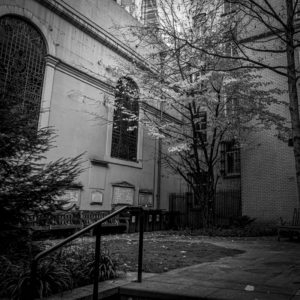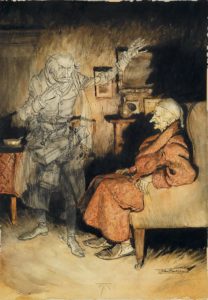Why do we find the character of Ebenezer Scrooge so fascinating?
Ebenezer Scrooge is a miser, a grinch and the last person you would want to chat to at your company Christmas party, but yet we keep coming back to the story of a man hardened by life’s knocks who is ultimately redeemed.
Six in the City share this fascination and in December we are running “A Christmas Carol walk” that introduces you to locations in the City of London that would have been the inspiration for Charles Dickens’s story and characters.
Ebenezer Scrooge on Film
A ‘Christmas Carol’ was written and published in 1843 and the story has been part of our Christmas DNA since then, due in no small part to the 28 Christmas movie adaptations, which gifted us Disney’s Scrooge McDuck and Michael Caine in A Muppet Christmas Carol, not to mention numerous radio versions, live theatre, pantomime, opera, and ballet interpretations of the classic tale. A Christmas Carol is also playing at the Old Vic this year.
Yet the central character of Scrooge in the book is more nuanced than the misanthrope that appears in the movies and it is worth returning to the book to discover why Scrooge is so compelling.
A Christmas ghost story
At its core A Christmas Carol is a ghost story, part of the long-established tradition of telling stories we have inherited from the oral tradition that predates the written word. Every year as we approach the winter solstice, when the nights are longest, and nature lies apparently dead and decaying around us we take delight in frightening the bejeebus out of each other by sharing cautionary tales of the supernatural.

Ebenezer Scrooge the miser
There is one thing that we can be sure of and that is the man Dickens introduces on 24th December is a miser, as curmudgeonly and tight fisted an example as it’s possible to imagine. As we all know, the word “scrooge” has become an insult and a generic term for a miser or misanthrope.
And this is driven home by the two gentlemen callers to the counting house in the early pages of the book. Asking for a contribution to aid the poor, he sends them away empty-handed with the comment about those who refuse the poor house “If they would rather die, they had better do it and decrease the surplus population”, words which will later haunt him.
Ebenezer even bemoans having to give Bob Cratchit Christmas day off and for making payment for a day without any return. When Cratchit points out it is only one day per year the response is “that’s a poor excuse for picking a man’s pocket every 25th December”.
Scrooge and Jacob Marley

The first spirit to visit Scrooge is not the ghost of Christmas past but rather his now deceased partner Jacob Marley, who warns him of the three spirits that will visit him. Ebenezer, in full denial, puts the experience down to an “undigested bit of beef, a blot of mustard, a crumb of cheese or a fragment of underdone potato”.
Intertwined with the horror is, of course humour, as after seeing Marley’s face on the doorknocker Scrooge looks behind the door expecting to see Marley’s pigtail. A comment which tells us much about men’s hair fashion in 1840s London!
The Ghost of Christmas Past
The visit of the ghost of Christmas Past is central to understanding how Scrooge became the miser we meet at the start of the book and the ghost takes Ebenezer to the firm of Fezziwig. Dickens was a romantic, he longed to recreate the simpler, happier times that he believed existed before Industrialization and Fezziwig embodies this, entering into the full spirit of Christmas. His reason being that he wants to preserve a way of life that is more important to him than money. Quite different to the behaviour of Scrooge, shown at the start of the book.
We then discover that Ebenezer fell in love at a young age to Belle, and the spirit shows us an episode which breaks his heart. Belle tells him he has changed, saying he now values ambition and money over their love and releases him from his promise to marry her. This is a very brave thing for any woman to do in the 1840s as there would be a great risk that Belle would never find the personal and financial security such a match would bring. Later we see her happily married with a family and Ebenezer laments yet more loss.
We read how his father treats him harshly and his close relationship with his sister, Fan. How she gives birth to a son and then, tragically, dies young. Ebenezer is again heart-broken; he has now lost the two people in his life who he truly valued. Having felt loss, he pushes away later attempts by his nephew to be close to him.
Is Redemption Possible?
As we read Ebenezer transforms from hopeful fresh-faced young man to miser. We have seen a child who was sent away from his family to school, treated harshly by his father and lost the two people he loved. He has few, if any, friends but is good with business and numbers and he turns away from love and kindness, becoming mean-spirited and without care for anyone else.
Is redemption possible? Dickens certainly believed so and to hear the rest of the story, come on our guided walking tour of the old City of London.
Wrap up warm, as we will visit cold dingy places and walk the same alleys once used by Dickens to talk of the visit of each spirit and hear how slowly Ebenezer finds the true meaning of Christmas Day. Click here to book.
